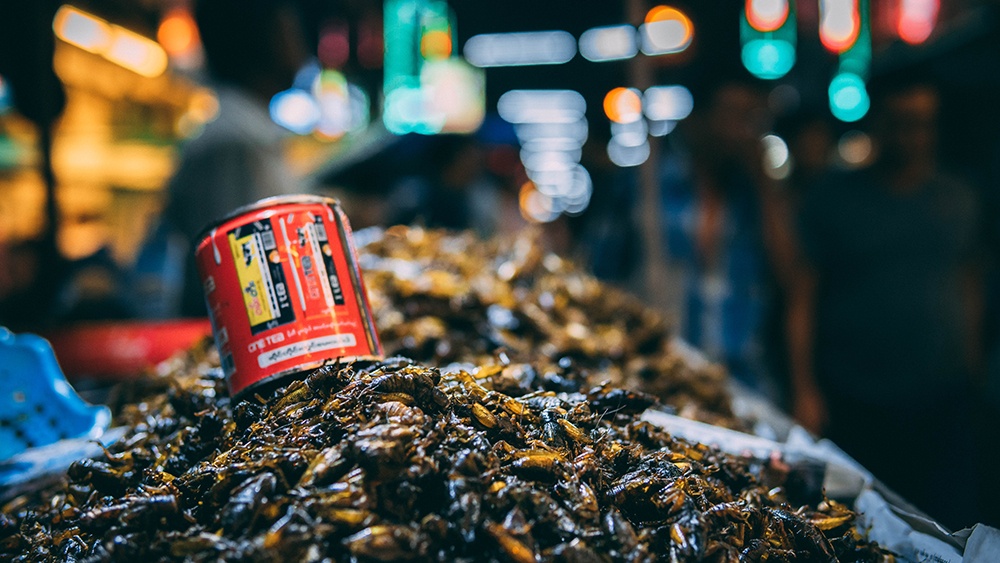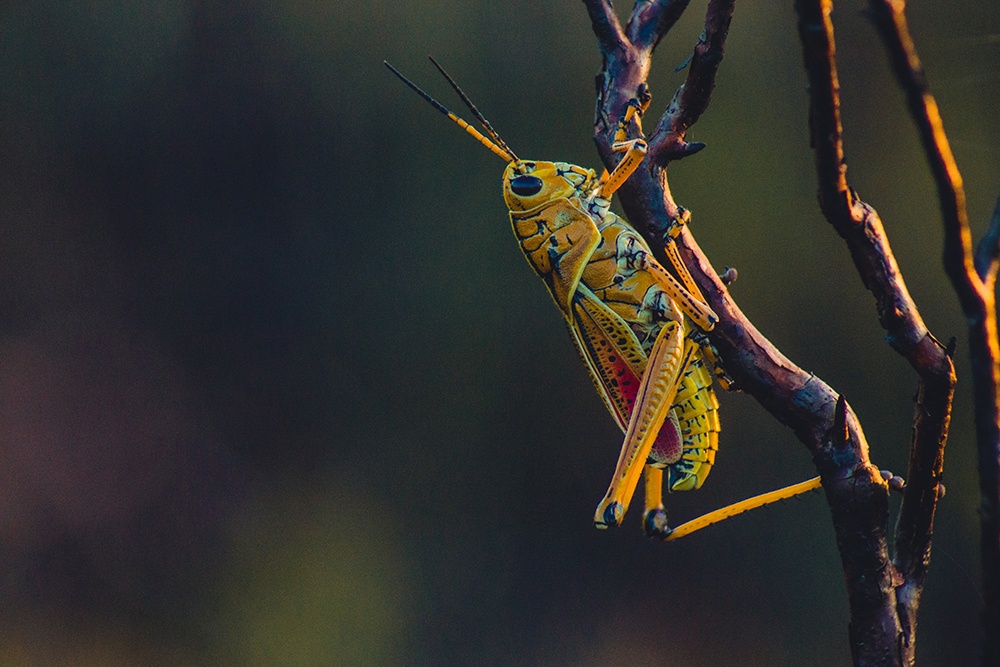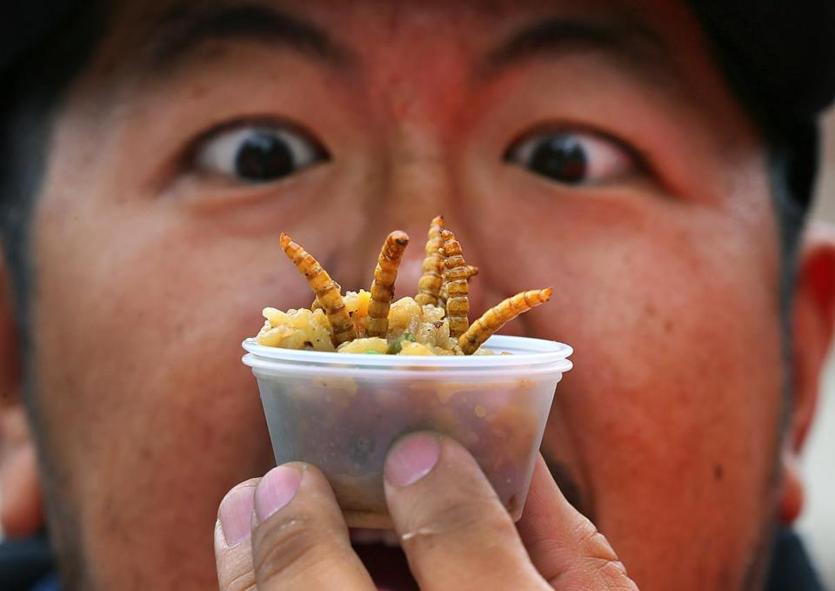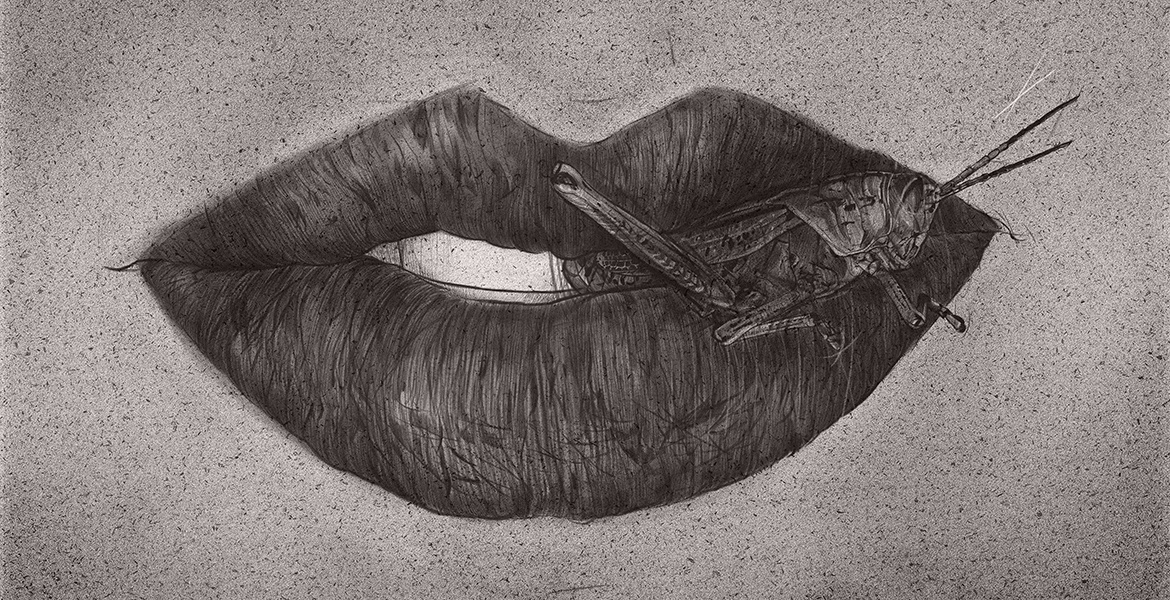The issue of pain and suffering among insects and other invertebrates does not occupy a very high place in the literature, perhaps that’s why obtaining protein from insects has recently become so popular. Do we as humans have the right to compare the scale of cricket suffering with cow suffering? Do we have the right to create more production halls using insects as food? Do insects feel pain?
People eat more than a thousand six hundred species of insects, among the dishes you can find ants larvae (Liometopum apiculatum) beetles, termites, wasps and bees, butterflies and moths, grasshoppers crickets. Some, like Bug Nomster, set up their home-breeding for consumption.
We are all insect eaters
The statistics say straightforwardly that each of us is an insect-eater: the US Food and Drug Administration (FDA) considers it fully acceptable for there to be thirty pieces of insect butter per hundred grams of peanut butter, and the chocolate standard is twice as high – Barbara J. King, Personality on the plate.

Every day we eat random flies and other smaller insects, while we sleep or run. We are insect eaters every day, but should this open the door for us to mass-breed these creatures and absorb them as another source of protein?
Entomophagy as a new nutritional trend?
Until recently I thought that breeding insects for food are a distant future, but cricket treats are served not only in Thailand, but in many European cities, and even in Poland, as a new, oriental delicacy and a cheap source of protein. The business took such a strong grip that it was decided to grow them on a large scale.
Therefore, according to scientists, insects can be a perfect substitute for meat. The more valuable is the fact that in addition to protein they contain a large number of valuable nutrients – calcium (four large crickets have it as much as a glass of milk), iron (especially rich in termites), zinc and vitamin B. But there are not many unhealthy fats in them. – Andrzej Hołdys Newsweek Poland, Edible insects. And you will become a worm-eater!
But what do we know about insects? The average person treats them as intrusive objects, unnecessary pests.
Amazing abilities of insects
Ants find the fastest path from one place to another, honey bees count and group similar objects such as dogs and human faces, cricket mothers warn their little ones, even before birth, about the danger of spiders, spiders, in turn, have many personalities, some are shy and others are more aggressive, cockroaches can recognize family members and live in small communities.
Read also: Why you really shouldn’t eat octopus?
Did you know that fruit flies, hated by many, have difficulty making decisions when they have too little data?
An even more well-known example of the learning ability of insects is the dancing of honey bees. In this case, the acquisition of new information takes place socially. They are usually performed in a dark hive, and dancers, experienced collectors, instruct younger, less experienced bees on how far to fly and in what direction to find the right flowers. – Personality on the plate. Barbara J. King
Insects have many sensory systems, including vision, smell, taste, touch, temperature, and humidity. Although it is sometimes claimed that insects do not have pain sensors, they have been discovered in several species of worms, including fruit flies. Even insects that do not have pain sensors can still react to other types of stimuli.
Insects show negative reactions to, among other things:
- excess heat
- Electric shock
- poking and pinching
Are insects capable of feeling pain and awareness?
Pain understood and felt by humans is a variable, subjective experience, involving a class of sensations associated with negative feelings and aversion. The experience of unpleasant feelings and the strong motivation to eliminate their source is known as the „suffering” experience.
The experience of suffering in other animals is related to psychological and behavioral changes such as increased blood pressure, limb reflexes (cramps?), making sounds that are usually associated with strong pain sensations in humans.
Until recently, scientists have described insects as having no central nervous system, but having independent coils controlling individual parts of the body. This could mean that the insects are not aware of it. However, the research described in the journal Proceedings of the National Academy of Sciences confirms the possibility of subjective experience in insects.

Andrew Baron, a cognitive scientist and Colin Klein, a philosopher, prove that subjective experience in the animal world can be much older and more popular than we previously thought.
Subjective experience – Do insects feel pain?
Subjective experience is the most basic form of consciousness. So if a being can have subjective experiences, it can also include pleasant and painful experiences.
When researching the consciousness and feeling of insects, there is always someone who touches on the subject of plants and their ability to feel. Dr. Baron and Klein claim that plants do not have the structures that allow them to feel consciousness. The same applies to simple animals such as jellyfish and roundworms; on the other hand, crustaceans and spiders such as insects have such structures.
We should, therefore, ask the question to what extent insects feel pain
Certainly, insects feel averse stimuli, smell or light, but we don’t have the tools to solve this puzzling puzzle or the insects feel the pain and suffering we know, but we know it’s only a matter of time and research.
If insects are aware, they can be considered „less aware” than vertebrates. People have at least 100,000 times more neurons than most insects. However, with industrial breeding and thousands of sensations, we can consider the moral consequences of our choices.
Mini livestock as an ecological version of protein sources
Mini livestock, because this is what is called large-scale insect farming, is proposed as a healthier alternative to human food, better than chicken, pig or cow breeding and less harmful to the environment.
For example, 80% of the cricket body is edible, compared to 58% of chicken. This means that consuming insects is technically more efficient, which also means that insects can be used as high-nutrition feed for animal feed instead of soya and wheat, which means that more soy and wheat can be given to people rather than animals.

However, scientists are considering the risks associated with the popularisation of insect farming. First of all, there are no legal regulations concerning insects used in food. People can start collecting or breeding insects for themselves, which can reduce the number of insects and disturb the ecosystem.
What is more ethical, killing one cow or 100,000,000,000 crickets?
FAO 2013 studies show that insect farming is much more profitable, crickets require only two kilograms of feed per kilogram of body weight, they can be grown on organic waste, their production produces fewer greenhouse gases and less ammonia than a traditional pig or cow farming.
And, of course, they require much smaller areas of land and water consumption. With all this data, would it be more ethical to kill one cow or 100 000 000 000 crickets?
If one can even consider something in such categories (however, such choices are often studied), the state of knowledge we have about insects today, it is not easy to answer this question. If we were wondering whether it would be better to kill one cow in order to replicate its cells in in-vitro, which will give us as much food as from the killed 10 thousand cows (random calculation, I do not remember the exact ratio), then this choice becomes easier for me.
I know that for many people the approach to these choices may be incomprehensible, but in order to change something in today’s world, we have to ask ourselves difficult questions and look for the most effective and most ethical solutions. It would be beautiful, but history shows that meat consumption has been on the rise for years and that successive richer countries have more and more appetites for them.
Isn’t it better to invest in plant-based alternatives or clean meat?
For meat fans, it is easier to try other meat than vegetable alternatives. Unless we are talking about pure meat, which is not entirely natural. I’m beginning to think that people just like to eat food shrouded in suffering.
While in developed countries people receive about 95 g of protein per day in their diets, of which almost 60% is made up of animal protein, in developing countries the intake of protein is only about 45 g/day, and only 15% is made up of animal protein. – Reducing the global environmental impact of livestock production
If we consider this in relation to an increasingly hungry world demanding sources of protein, industrial insect farming can be justified, because it is less harmful to the environment, but it is still unethical for me. In my opinion, clean meat can help the world’s animals much more.
Today, crickets are the latest trend, they are served as chocolate cricket cookies or cricket meal products. This is usually not the insect itself, roasted in a frying pan somewhere in the distant countries of the East, today we can buy ready-made bars.

Are we able to recognize worms as sentient beings?
For meat fans, ethical reasons are often not important, why should they care about the feeling of worms? And will vegetarians and vegans take this into account? For many vegetarians, eating fish is not a problem, after all, it is the reduction of suffering that counts. You can close the subject with one word, an animal is an animal, and we should not kill it.
Eating insects may seem better than eating cows, but does it solve our problem? We are creating another type of breeding, another type of production, another type of law and regulation, and we do not know how this will affect the environment.
We have a problem with the introduction of clean meat, which could revolutionize the world and put an end to animal suffering, while we are creating yet another industry based on the harm done to millions of beings.
Following Peter Singer’s words, we ridicule monks who respect the smallest forms of life, who remove ants from their path, shouldn’t we admire them for carrying compassion? Nor should we now campaign for the rights of insects, we still have too little evidence of their subjective experiences, and the world is not yet ready for such campaigns, in particular, that we know much more about the suffering of vertebrate animals and that their rights are still not satisfactory. This is something we should address immediately.
The question of animal consciousness remains unexplained and is still open. We cannot, therefore, set up further suffering camps.
sources:Minilivestock /What insects can tell us about the origins of consciousness /
I ty zostaniesz robakożercą. / Do insects feel pain?
Reducing the global environmental impact of livestock production: the minilivestock option
If insects have consciousness, what then?
The Importance of Insect Suffering
Photo by Harish Shivaraman on Unsplash and Gouthaman Raveendran
Illustration: Pani Krysia

